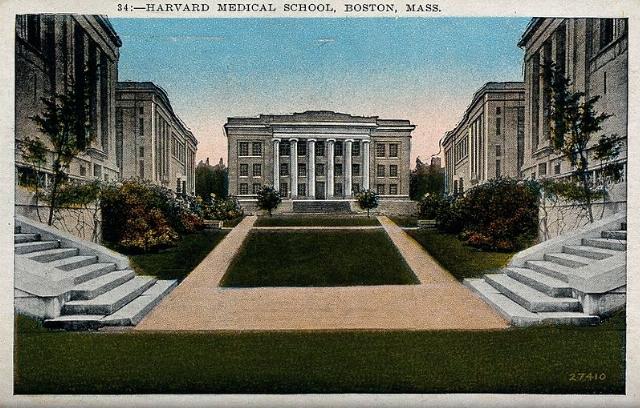We support our Publishers and Content Creators. You can view this story on their website by CLICKING HERE.
“All professions are conspiracies against the laity.” — The Doctor’s Dilemma by George Bernard Shaw, Act I (spoken by Sir Patrick Cullen to fellow physician Sir Colenso Ridgeon).
The recent presidential resignations at vaunted schools such as Harvard, Columbia, and Penn, which Representative Elise Stefanik (R-NY) and other members of Congress pushed for and celebrated, are promising less and less to be long-term solutions to the disorder that has pervaded the college campuses. Moreover, the current situation may well bode future deterioration of the quality of the physicians that these and other schools produce. That’s because American physicians’ traditional arrogance is becoming tightly entangled with hard-left, woke ideology.
Although I am a lawyer, I have seen what is happening with physicians because I have been married to a physician for almost forty years, so I’ve paid close attention to what is happening in her field. These are my views, of course. My wife, if she so chooses, is quite capable of similarly critiquing from her own perspective the implications of the situation upon the legal profession.

Image: Harvard Medical School, c. 1928 from the Wellcome Trust collection.. CC BY 4.0.
To be sure, my interactions with and exposure to the medical profession during my formative years were overwhelmingly positive. I have been treated by some of the best medical practitioners ever (including Dr. C. Everett Koop, a future U.S. Surgeon General). My mother’s brother was always a positive model of a physician. My cynical view of the medical profession is accordingly institutional and not personal.
When I was in junior high school, I read the autobiographical bestseller My Life in Court by Louis Nizer. There, he recounted a medical malpractice case where he prevailed by finding a newly minted physician who, through an apparent combination of principle and naïveté, was willing to defy the medical profession’s effective omertà by testifying at trial that the defendant obstetrician had been negligent in performing a delivery that neither mother nor baby survived.
While an undergraduate, I had an on-campus job shelving books in the university library. The floor where I worked contained the stacks for Library of Congress classifications Q (Science) and R (Medicine). Many of the bound periodical volumes in those stacks had missing pages. There were instances of students being caught in the act of tearing out the pages. Each time, it was a pre-med student who sought to gain academic advantage over his fellow classmates by depriving them of access to the article in the competition for acceptance to medical school.
Moreover, my Insurance & Risk professor mentioned in a lecture that the rising costs of healthcare (even back in those days) were caused in no small part by the medical profession’s actions that deliberately limited the numbers of physicians.
During the medical malpractice insurance crisis of the 1970s, I cynically commented to friends that the physicians, having used their political power to gain exemption from jury duty, were then complaining that the juries from which they had excluded themselves were delivering high-dollar verdicts against them in medical malpractice lawsuits, thereby jacking up the cost of insurance coverage.
Physicians had long carried the attitude that they were too genteel to become bogged down in litigation. They were content to pay the Danegeld to plaintiffs’ attorneys to quickly settle any medical malpractice lawsuits brought against them. This strategy caused med-mal lawsuits to become a means of financing healthcare.
At a dinner table discussion with my wife regarding the disorder now plaguing college and university campuses, she noted that, of the four recent Ivy League school president resignations, three of the four replacements are physicians. Katrina Armstrong, MD, replaced Minouche Shafik as President of Columbia University; J. Larry Jameson, MD, PhD, replaced Liz Magill as President of the University of Pennsylvania; and Alan M. Garber, MD, PhD, replaced Claudine Gay as President of Harvard University.
Although a Columbia alumnus friend of mine e-mailed “Ding Dong, the witch is dead” to his contact list upon Shafik’s resignation, we clearly cannot expect much improvement under the watch of whomever ultimately becomes installed as her successor (Dr. Armstrong being an “Interim” President of the institution). The President of Columbia University is effectively answerable only to Columbia’s radicalized faculty—and Columbia’s governing board is terrified of offending the faculty. Ditto for all other so-called “elite universities,” Ivy League or otherwise.
Conservative judges have expressed their concerns regarding the suitability of Columbia’s law graduates to enter the legal profession. Whether the new presidents of Harvard, Columbia, or Penn exploit the opportunities their new positions have availed them to address similar concerns regarding the medical profession remains to be seen.
The politicization of the medical profession in academia, including at the pre-medical college major stage, is driving so many physicians and medical students to violate their Hippocratic Oath (my wife’s incredulity and disgust on this exceed my own), not only in America but in other countries also. If the physicians in American academe (and the lawyers there, too) do not soon address the wokeist wave that is now corrupting higher education, then American medical schools can be expected to produce future crops of physicians such as Dr. Josef Mengele, Dr. Che Guevara, and Dr. George Habash.
Kenneth H. Ryesky, a writer currently based in Israel, is an attorney who taught business law and taxation at Queens College CUNY for more than two decades.

 Conservative
Conservative  Search
Search Trending
Trending Current News
Current News 


